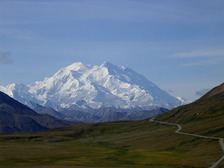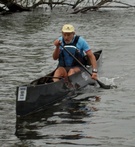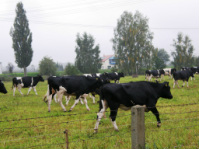 Alaska's great mountain, Denali
Alaska's great mountain, Denali itself. Like its license plate says, Alaska is the last frontier. And, while I enjoyed the uniqueness of the Alaskans, their friendliness, and the cool August weather, I would like to make an observation about a couple I saw on our airplane journey home.
I was pushing my wife (who is recovering from a leg injury) in a wheelchair to load her onto the plane when an airport attendant asked me to move while he maneuvered another wheelchair occupant in front of us. The man had to be with his wife (who was in a wheelchair ahead of us), the
attendant said – since they were travelling together. No problem, plenty of time. So the three wheelchairs made their way onto the plane. A real convoy.
What surprised me was when the man and his wife got out of the wheelchairs, just before boarding the plane, they walked normally. Their main problem was that they were morbidly obese and got tired walking. Both of them.
We sat behind them – on the opposite side of the plane, which gave me time to reflect on their dilemma. They both looked to be in their 70s or maybe a bit younger. It’s hard to tell when people are so obese. The two of them took up nearly three seats. As the man ordered and ate plenty of junk food, I observed that he seemed to have no trouble stuffing food into his mouth. No disability in that regard. Here, I thought, is the essence of old age in America: become obese and ask attendants to wheel you around the airport. Is America a great place or what? This couple knew how to play the game – milk the system for all it’s worth. I would guess that they have blood pressure problems and are likely members of the FDA (future diabetics of America).
A few minutes later, a disabled man came down the aisle, using a cane and hobbling on his own, too proud to ask for help. He was about the same age as the obese couple but he was not overweight. I thought about our 91-year-old LifeNut, Mike Fremont, who still runs marathons and races canoes. Trim and healthy, Mike represents what old age can be like.
What’s wrong with this picture, I asked myself. Why do we reward bad behavior? Why don’t we charge morbidly obese people for wheelchair services and add a few bucks to their air ticket to compensate for their excessive weight that the plane must carry? Where's accountability? Many communities have wonderful wellness programs but our society continues to grow fatter and fatter. LifeNuts takes a new approach by measuring participants each year. Accountability.
As I watched this large man, I realized that this is the coming picture of old age in America: obese Boomers who require help walking. Helpless, they beg for assistance, draining energy from others. Not caring about their unhealthy lifestyle, they have no intention of changing. As the Boomers, the most obese generation, continue to age, they’ll fall into this scenario. Some will have enough pride to do things on their own but some, like the airplane couple, will take advantage of others.
Yes, perhaps they had a legitimate medical issue, unrelated to their obesity, but I am inclined to doubt it. In my opinion, they represent the future of old age in America. And it’s not pretty.
So, I implore you runners or whoever happens to read this: coax your overweight friends and relatives to join us in Indianapolis in November. With only two months to train, there isn’t much time left and the obesity clock is ticking …
Now for Mike’s words of wisdom. And, as you read the thoughts of this 91-year-old, I want you also to think of the obese couple in the airplane. Like night and day.
Sojourn with nature week of August 11:
Sun. Ran 10 mi.
Mon. Raced canoe 3
Tue. Ran 10
Wed. Raced canoe 3
Thu. Travel
Fri. Conference, with demonstration run
Sat. Travel
Plan for week of August 26:
Run 30 miles
Race 3 x 3
miles in canoe
Rest 1 day
A PUBLIC HEALTH CRISIS
1. We don't have a health-care crisis - we have a public health crisis. These were the first words of an article I wrote NINETEEN YEARS AGO!
The main purpose of health care should be to improve the public health, not just take care of illness, not only to reduce suffering and extend the lives of the ill, BUT TO PREVENT DISEASE AND INCREASE LIFE EXPECTANCY FOR ALL.
What we hear today is health care cost, out of control and growing, and that many are not covered by health insurance and thus are denied care they cannot personally afford. How can we design a plan that delivers care to all and is still nationally affordable?
The debate is about how to improve efficiency - by competition, limiting the number of payers, caps on services and medical liability, expensive machines strategically located (instead of everywhere), fee limits, exclusion of certain ailments, etc.
This is attacking the problem from the wrong end. We will neither significantly improve
public health nor affect health costs this way.
2. The most important single action we could take to improve public health and reduce health
care costs WOULD BE TO CHANGE THE AMERICAN DIET. Today that is what is
called prevention. But prevention is NOT PRACTICED IN THE AMERICAN HEALTH CARE SYSTEM!
The per capita annual expense of health care was $4000 in 1994; today it is $9000. That makes it about 18% of the GDP. Diet is implicated in a majority of heart disease deaths. Some 75 percent of deaths are diet-related and diet is implicated in many types of cancer, diabetes, osteoporosis, obesity (of course), arthritis and dental disease. To affix a cost to a premature death, use US government figures of from $2 million (US Dept. of Transportation) to $6 million (I believe from US EPA).
There's not space in this little blog to tell the whole story. Perhaps in a subsequent blog or two. But the only diet that can fully solve this problem is a whole foods plant-based one, again in my not so humble opinion! .or reasons you may have read in blogs 1 thru 10. It's the diet we advocate in LifeNuts. Try it. Not much to lose, except an early demise.



 RSS Feed
RSS Feed